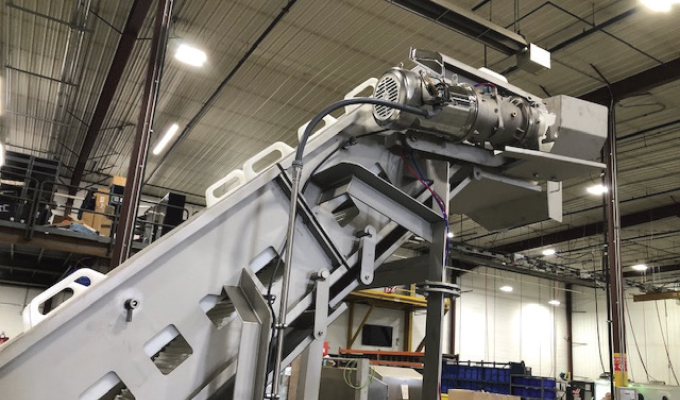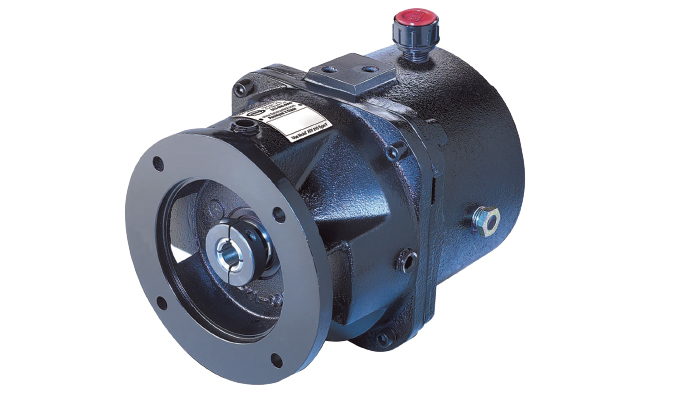Across a number of markets, for commercial, municipal, or industrial uses, incline and standard conveyors need to perform under demanding conditions with reliability and precision. Any component that can make these conditions more tolerable and predictable is a boon to operators. One such component—Force Control Industries’ Posidyne® X-Class clutch brakes—is ideal for incline conveyor applications because they provide precise positioning each cycle, they act as a holding brake so that materials never slide backward on the incline, they are oil filled and sealed so they do not rust, and they do so without maintenance or adjustment.
Posidyne X-Class clutch brakes allow higher cycle rates (as high as 300 cycles per minute), and unparalleled service life (20 to 40 million cycles) to increase production rates with lower downtime. With improved speed and precision, the value engineered X-Class clutch brakes allow machine designers to run at higher cycle rates and quality levels. In addition to their use on incline and standard conveyors, they are ideal for many OEM applications including packaging machinery, food processing, meat packing, dynamite/gunpowder processing, production machinery, extruder cut-offs, palletizers, feeders, inserters, loaders, cut-offs, fillers, and more.
WHY DRY CLUTCH BRAKES FAIL
While standard dry clutch brakes use a sacrificial wear surface that abrades and wears over time. That elongates the engagement time, thus requiring maintenance and adjustment to bring the plates closer together. High heat buildup causes the wear plate to glaze and can prevent it from holding the inclined load. When that happens whatever is loaded onto the conveyor slides backward until gravity takes its toll and the material typically ends up on the floor.
The maintenance, adjustments, and replacement of dry clutch brakes causes downtime—and higher scrap rates. Because they are typically not sealed, the high humidity and frequent washdowns required in food and beverage processing applications cause the internal components of dry clutch brakes to rust, requiring maintenance or replacement.

WHY OIL SHEAR WORKS
Posidyne X-Class clutch brakes feature oil shear technology, which is the reason that they last up to ten times longer than standard dry friction brakes and do not need maintenance, adjustment, or disc replacement. Unique oil shear technology provides a film of transmission fluid between the brake disc and the drive plate. As the fluid is compressed, the fluid molecules in shear transmit torque to the other side. This torque transmission causes the two components to reach the same relative speed. Since most of the work is done by the fluid particles in shear, wear is virtually eliminated. Elimination of wear also eliminates the need for adjustments and maintenance—and prolongs the service life. In addition to transmitting torque, a patented fluid recirculation system helps to dissipate the heat from the friction surface to the housing where it is cooled. The inability of the dry friction units to dissipate the heat out of the friction material is a major cause of wear and friction material breakdown.
Along with heat removal and torque transmission, the fluid serves to continually lubricate all components of the oil shear units, so that they do not rust. This significantly increasing their service life, especially in the high humidity levels often seen in food processing plants. Nickel-plated components stand up to the caustics used in the frequent pressure washing, to further elongate service life.
INNOVATIVE DESIGN
The Posidyne X-Class features an innovative Split Clamped Quill feature, which reduces shaft and key/keyway damage to the motor shaft associated with competitive clutch/brakes. The split quill collar tightens the quill 360 degrees around the shaft and key for superior connection.
Convenient options such as foot mounting kits, manifold mounted valves and optical encoders with closed loop positioning controls are available to fit most applications. The totally enclosed Posidyne X-Class is impervious to dust, dirt, chips, and other elements. With a washdown or marine duty option they are resistant to chemicals, coolants, caustic wash down, weather, and more, making them ideal for hostile environments,
All Posidyne clutch brakes are designed with low inertia cycling components. This makes them even more efficient, requiring less motor horsepower to accelerate the load, and less torque to stop the load. By reducing the motors’ high inrush currents and the associated power factor imbalance, these unique clutch/brakes can provide significant energy savings in 24/7 manufacturing demands.
A simple actuation system allows torque in the clutch and brake to be precisely controlled through air. Adjustment for rapid or soft starts and stops is easily accomplished. Manifold mounted control valves reduce response times by eliminating hoses and fittings while providing a space efficient design.
The Posidyne X Class clutch brake is not a servo; however, it can often be used where the highest servo performance or complexity is not required, but performance beyond that of an ordinary clutch brake is. The Posidyne X-Class cycles faster, stops more accurately, and provides years of trouble-free service—without the need for a servo expert on staff.
FOR MORE INFORMATION
Headquartered in Fairfield, Ohio, Force Control Industries is the world leader in oil shear technology, offering a full line of clutches, brakes, and clutch brakes for OEMs in diverse applications. Their manufacturing campus includes three manufacturing facilities with over 100,000 square feet of manufacturing space along with engineering, design, customer support, and administrative offices. For more information, call 513.868.0900, email sales@forcecontrol.com, or visit www.forcecontrol.com.
MODERN PUMPING TODAY, March 2024
Did you enjoy this article?
Subscribe to the FREE Digital Edition of Modern Pumping Today Magazine!


